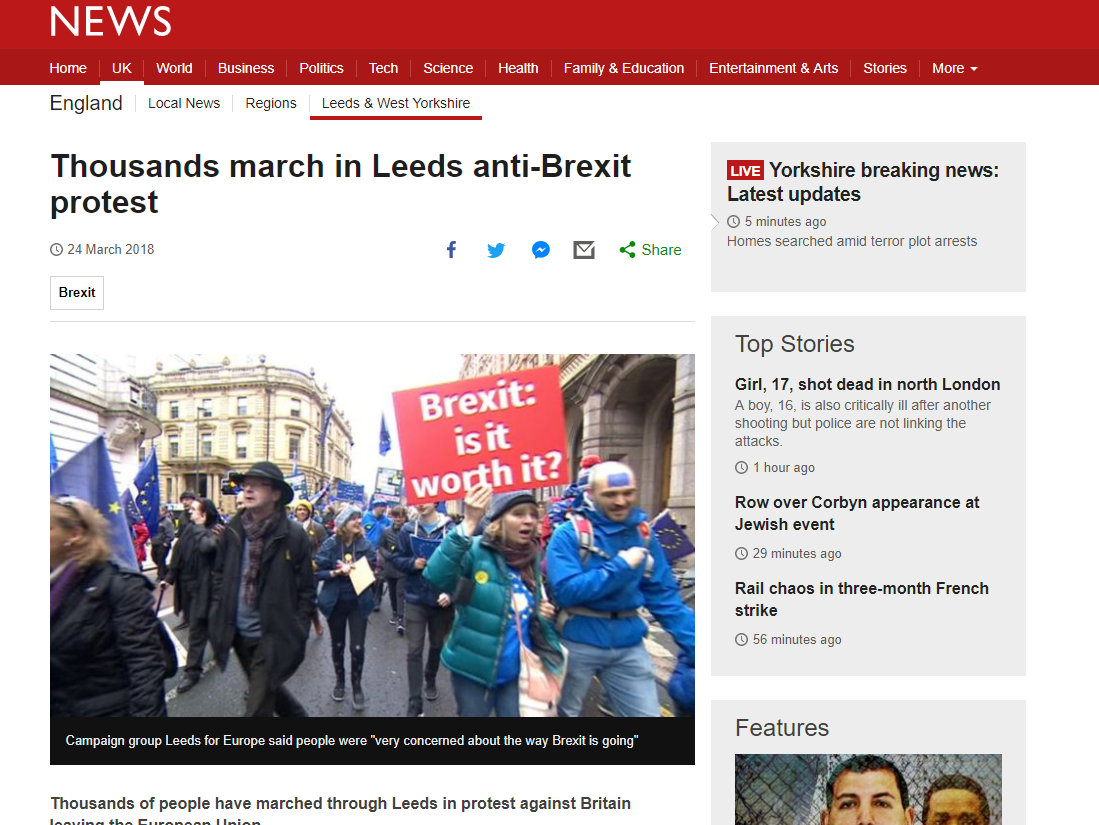
The BBC’s UK news editor has defended the corporation’s coverage of Brexit after accusations that a “deliberate blackout” had been imposed on coverage of protests attended by hundreds of thousands people.
Richard Burgess told Radio 4’s Feedback on Friday that both pro and anti- views on Brexit have been covered “significantly” across BBC output.
Regional news programme Look North ran coverage of the Leeds anti-Brexit march attended by Lord Andrew Adonis on 24 March as its second story, Burgess said, and the event was also covered online. Marches also took place in Edinburgh and Pontypridd on the same day.
Adonis has been a vocal critic of the BBC’s Brexit coverage.
Burgess said there are a number of factors that can determine whether marches are covered on BBC News, which were not fulfilled by the anti-Brexit protests.
“When we’re making an assessment of whether we’re going to cover a protest like this, it’s influenced by a number of factors,” he said.
“How much of a live issue is it, how much of a developing issue is it, is this march likely to bring about significant change, has it been influenced by very recent events, is there a real developing news story around this march?”
These criteria, Burgess added, were better fulfilled by the March For Our Lives demonstration in Washington DC which took place on the same day and received much wider coverage on the BBC.
He said: “That is exactly what I’m talking about – a developing story, an extraordinary march of hundreds of thousands of young people, emotional speeches, after a significant event recently, the Parkland high school shooting, and the potential of a change in the way America views their gun laws.”
Feedback received a number of emails from people “to express their suspicion that a deliberate blackout of anti-Brexit protests had been imposed,” according to host Roger Bolton.
One listener said: “I was pretty disgusted because they almost didn’t handle it at all,” while another “felt the BBC was failing in its duty of balance”.
A third listener asked: “How many thousands of Brexit demonstrators are required for the BBC to consider it newsworthy?”
Burgess responded: “I don’t think you can put an exact figure on it – that would be wrong – because you have to take into account what happens on the march as well.
“There might be an extremely powerful speech, there might be a significant event there, and I do think you have to take into account where it sits within the news agenda.”
He added that it is “quite difficult” to accurately estimate the number of people attending a march, after claims that his estimate of the Brexit protesters – “hundreds or thousands” – was lower than reported elsewhere.
He said he believed the news team needs to “continually look at this issue” and monitor when marches are happening to determine what level of coverage they get.
Later in its series, Feedback plans to look in depth at the BBC’s coverage of Brexit across its news coverage and other programming, Bolton said.
Following Burgess’s appearance on Feedback, Adonis, who attended Leeds for Europe’s anti-Brexit march, tweeted: “BBC News needs new leadership after BBC News Editor Richard Burgess’s astonishing ‘defence’ of BBC boycott of big anti-Brexit marches last weekend – rubbishing them as of little account on Feedback then giving Mr Farage huge coverage for his fish stunt two days later.”
Former Ukip leader Nigel Farage was among protesters who threw fish into the River Thames on 21 March to draw attention to the delay in leaving the Common Fisheries Policy as part of the UK’s Brexit transition deal, which they said would have a detrimental effect on the British fishing industry.
Speaking on Feedback, Burgess said: “I don’t think we did cover the Nigel Farage thing much –it wasn’t on the Six or Ten o’clock News.
“We might have done a little bit of marginal coverage.
“There’s a specific issue that’s developed since the transition deal was agreed around the Common Fisheries Policy. It did give us an opportunity to get into that issue.”
Picture: BBC
Email pged@pressgazette.co.uk to point out mistakes, provide story tips or send in a letter for publication on our "Letters Page" blog
